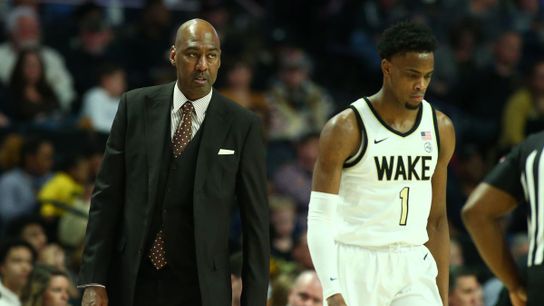On Saturday, Wake Forest announced Danny Manning will not return for a seventh season as the head coach of the Demon Deacons' basketball team. The news was surprising, given that the team's season ended 45 days ago.
To illustrate exactly how long AD John Currie waited to make this decision, Wake Forest actually played an ACC Tournament game, falling 81-72 to Pitt all the way back on March 10.
The point here isn't to argue whether or not Manning deserved to be fired. The former No. 1 NBA draft pick leaves Winston-Salem with a 78-111 record, never reached the NCAA tournament field of 64, and dropped at least 13 regular-season ACC games in five of his six seasons. This was a basketball decision, one simply delayed by world events.
"After a comprehensive review of the men’s basketball program, and with the support of President Hatch and University leadership, I have determined that it is time for a change in our head coaching position," Currie said in a statement. "We thank Coach Manning, Julie and Evan for their service to Wake Forest and for their commitment to our student-athletes and the Winston-Salem community over the past six years."
But that's the thing: In the middle of a global pandemic that has sent budgets across college athletics budgets into free fall, Wake Forest fired its basketball coach, for basketball reasons. Manning wasn't pushed out due to scandal, he was fired simply because he didn't win enough.
This means, as CollegeBasketballTalkreported, Wake Forest owes Manning a $15 million buyout, according to the terms of the extension he signed in 2017.
Days after Dave Clawson took a 10 percent pay cut, Wake Forest sent Manning out the door with a $15 million golden parachute.
We don't know the structure of Manning's buyout, whether he's owed a lump sum in 60 days or whether Wake can spread the payments out in monthly installments from today through the year 2050. That matters, as the economic pain spread millions across the country, while very real, is expected to be relatively temporary. When business as usual returns again, Wake Forest basketball will still be a big business, and Currie had plenty of time to run a cost-benefit analysis that assuredly told him it would be more expensive in the long run to retain Manning than keep him -- particularly in a year where Wake happens to be the best job on the market.
Again, the point here is not to litigate the merits of Manning's firing.
The point is this: If there is a college football season, the industry-wide assumption is that market forces will lead a lot of schools that may have otherwise moved on from their coaches to give them another year, simply to avoid paying their buyout (especially if the season is delayed to the spring). And that very well may prove true.
But, like any other economic choice, the decision to move on from a head coach is an intensely personal one, and Wake Forest's choice shows we could be in for more movement than some anticipate.
